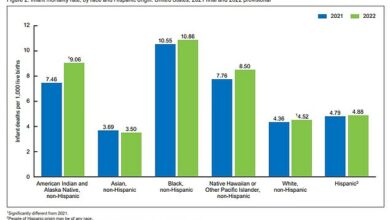Ozempic and Wegovy drug approved to treat heart problems, move that could open the door to millions more Britons getting the fat-burning jabs



British drug watchdogs have approved the use of semaglutide, the main ingredient in Ozempic and Wegovy, as a preventive drug against heart attacks and strokes.
The decision comes after scientists hailed the results of a study earlier this year, which found that patients taking the drugs reduced their risk of these health problems by as much as a fifth, and called for the drugs to be used more widely.
Announcing the measure, the Medicines and Healthcare products Regulatory Agency (MHRA) said the weekly jabs should now also be offered to overweight and obese adults with cardiovascular disease as a “preventative treatment”.
It could open the door to millions of Britons being able to get the fat-burning jab.
The expansion of the conditions for which semaglutide can be prescribed applies only to Wegovy, the formulation of the drug for patients looking to lose weight, rather than Ozempic, which remains specifically for diabetes,

British medicines regulators based their decision on the largest study yet of Ozempic and Wegovy, which found their key ingredient was a “game-changer” for heart patients, including those who failed to lose weight.
It is the first weight loss drug prescribed to prevent cardiovascular diseases such as heart attacks and strokes.
Cardiovascular disease is the cause of around a quarter of all deaths in the UK, which equates to 170,000 deaths a year or 480 deaths a day.
According to the MHRA, the following conditions apply: a BMI of 27 or higher, a value that indicates that someone is overweight and a diagnosed cardiovascular disease.
Currently, people in the UK can only get Wegovy through the NHS if they have a BMI of at least 30 and a health condition related to their weight, such as high blood pressure.
The MHRA’s decision does not mean that the NHS will immediately prescribe Wegovy on this new basis.
A separate body, the National Institute for Health and Care Excellence (NICE), must assess whether Wegovy is a cost-effective use of taxpayers’ money.
NICE told MailOnline it expects to publish the results of the appraisal next summer.
MHRA officials based their decision on a clinical trial involving more than 17,000 people, which showed that people who received the jab weekly for up to five years reduced their risk of serious cardiovascular events by 20 percent.
Shirley Hopper, deputy director of innovative medicines at the MHRA, said: ‘We are confident that the appropriate regulatory standards for safety, quality and effectiveness have been met for the authorisation of this medicine.
‘This treatment option that prevents heart disease and stroke is an important step forward in addressing the serious health consequences of obesity.
“As with all medicines, we will closely monitor its safety.”
Professor Bryan Williams, scientific and medical director at the British Heart Foundation, said: ‘Nearly two-thirds of adults in England are overweight or obese.
‘People who also have established cardiovascular disease are at high risk of having a serious event such as a heart attack or stroke.
‘Several recent studies have shown that semaglutide is an effective agent that can improve the quality of life of people with cardiovascular disease, including by reducing the risk of serious heart disease.

Wegovy and Ozempic work by stimulating the body to produce a hormone called GLP-1 which is naturally released from the gut after meals
‘It is important that people who use the medicine to lose weight and improve their health get the support they need from healthcare professionals so that they can maintain these improvements in the future.
‘This means appropriate training and development of healthcare staff, along with policies to create a broader environment that supports everyone to stay as healthy as possible. Taken together, this can help save lives from the devastating impact of heart attacks and strokes.’
Ozempic and Wegovy are hormone injections that trick the body into feeling full, causing people to lose weight.
Losing weight already helps to reduce the risk of heart attacks and strokes. However, the clinical risk reduction observed was also clearly visible in patients who did not lose weight.
This suggests that the drugs target an underlying biological mechanism that reduces the risk of such events.
Doctors believe this may be due to mechanisms such as improving blood sugar levels, blood pressure or inflammation, as well as direct effects on the heart muscle and blood vessels.
Although semaglutide-based drugs are associated with a number of benefits, like all medications, they come with side effects that vary in severity and frequency.
The most common complaints are gastrointestinal complaints, such as nausea, diarrhea, constipation and vomiting.
But other, stranger symptoms, such as hair loss, have also been reported in some patients.
Ministers in Britain have previously made plans to provide the drug to millions of obese Britons, in a bid to cut the sky-high benefits the country receives from sick Britons who take time off work and curb the rising cost to the NHS of treating excess fat.
While the hormone-mimicking injections are designed to help obese patients become healthier, there are also growing concerns about the number of normal-weight and underweight patients taking these injections for cosmetic reasons.
Some even required emergency care after getting vaccinated to get “beach body ready.”
Young women in particular are said to purchase Wegovy from online pharmacies. The pharmacies offer the products for amounts between £150 and £200 ($200-$250) per month, after providing false information about their appearance and health.
In some cases, it is thought that people who receive the vaccinations without a valid medical reason do so as a result of an eating disorder.
The increasing demand for the vaccines worldwide, including among people who take them for cosmetic reasons, has left some diabetes patients struggling to get enough vaccines.
It has also led to a huge increase in profits for pharmaceutical giant Novo Nordisk, which makes Ozempic and Wegovy.
Earlier this year, the Danish company announced it was making £32 million a day as countries struggling with the financial costs of fat tissue fight to get their hands on the vaccines.
Analysis shows that the combined turnover of the Ozempic and Wegovy brands generated £20.5bn this year.




